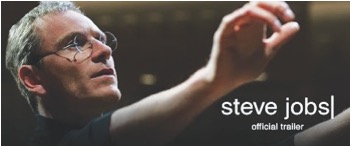 By Muhammad Muzammal
Assistant Arts and Entertainment Editor
By Muhammad Muzammal
Assistant Arts and Entertainment Editor
“I am the conductor,” so declares Michael Fassbender as the titular character of Danny Boyle’s new film, the Aaron Sorkin-scripted “Steve Jobs,” a non-traditional biopic of the former enigmatic CEO of Apple Inc.
And non-traditional is the most accurate way to describe “Steve Jobs.” With the use of a three-act structure, Sorkin composes “Steve Jobs” much like his hero composes his Apple orchestra – with an intense, verbal fervor. Sorkin’s script, full of one-liners, one-upmanship quips and character melodrama, digs deeper into the head of the tortured genius, who was poised to drive his company to world dominance, despite having poor relationships with the people closest to him.
“Steve Jobs” then, is a deep psychological study of its hero. The movie tackles Jobs’s multifaceted personality, showing scenes of Job as an unloving father, a hard-ass boss, a selfish friend and a cruel leader. Sorkin’s script becomes both redemptive and revealing as the film progresses, reaching a cathartic sequence in the third act that pits Jobs against his failing relationship with his daughter Lisa (Mackenzie Moss).
The film’s three acts take place in real time, with Jobs preparing backstage for the launches of different computer products, two of them associated with Apple (1983 and 1998) and another associated with NeXT, Jobs’s venture after being fired from Apple in the mid-1980s.
Centered in each act and scene is Jobs, who breathlessly rehearses product launch speeches with his loyal, caring “work wife” assistant Joanna Hoffman (Kate Winslet) and tatters back and forth with current and former work associates Steve Wozniak (Seth Rogen) and Andy Hertzfeld (Michael Stuhlbarg).
Joining the aforementioned trio is John Sculley (Jeff Daniels), former CEO of Apple and more importantly to the film, Jobs’s mentor and the closest father figure the orphan Jobs ever had.
Therefore it’s fitting that Sculley plays psychotherapist to Jobs whose alienated, lonely upbringing is brought up in flashbacks. The flashbacks give Jobs a powerful reason to operate the way he does, for the absence of his real parents gave the genius a painful, irreversible truth.
Which is why Sorkin zeroes in on Jobs’s relationship with Lisa. Sorkin’s last scripted feature, “The Social Network,” also dealt with a public figure behind a largely used platform. Whereas “The Social Network” documented the growth of a massive social media conglomerate, “Steve Jobs” strives for something more human. It doesn’t study Apple’s influence on the world; rather it studies the man behind the company who had so much influence as a leader, but so little as a father.
Sorkin never insults Steve Jobs. He creates a man fueled by orphanic circumstance and pushed by his endless imagination. That we never feel true hatred for Jobs despite his coldness as a father to his daughter (especially in the first act where he denies Lisa’s relation to him), is a testament to the film’s writing and central performance.
And what a performance it was. As he is accurately self-described in the film, Steve Jobs was the conductor of Apple. In “Steve Jobs” the film, Sorkin provides the notes and Fassbender gives them harmony. Fassbender’s rapid vernacular in the role fits Sorkin’s quick-witted dialogue and the actor’s depiction of Jobs as a man full of a venomous rage, who paradoxically loved but also loathed himself more than anyone else, make Apple’s far-gone leader an enduring character.
Boyle’s direction is frenetic and at times, takes a backseat to the writing and performances. Maybe that’s a good thing; Sorkin and company have assembled a brilliant film that is not only captivating, but provocative with its superb script and Shakesperean melodrama. It is a true must-see.


